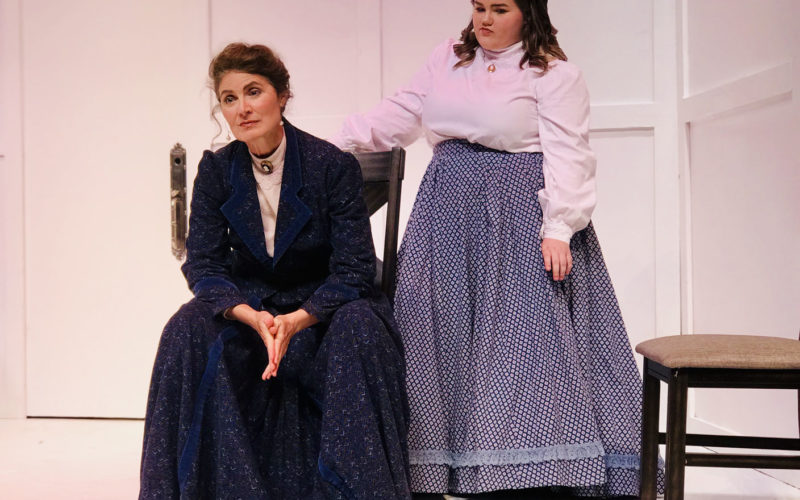Nora walks back in to ‘Doll’s House,’ unapologetic
BECCA MARTIN-BROWN
bmartin@nwadg.com
It all starts with a knock on a prominently placed door.
In this stark white room, in an upper-middle class home in 1894 Norway, the most shocking visitor imaginable has come to call.
If you’re familiar at all with Henrik Ibsen’s “A Doll’s House,” which premiered in 1879, you know that Nora Helmer has an epiphany about love, marriage and freedom and walks out on her husband, Torvald, and their three children. In Lucas Hnath’s 2017 sequel, she walks back in. But don’t think she’s come crawling, asking for mercy or even absolution. She just needs a favor — the divorce she thought her husband filed 15 years ago. It’s no surprise he’s disinclined to be helpful.
That’s the premise for “A Doll’s House, Part 2,” which earned eight Tony Award nominations and won Best Performance by an Actress in a Leading Role in a Play for Laurie Metcalf as Nora.
“It seems a little pretentious to write a sequel to a play that changed the face of modern drama,” admits Kris Isham, who plays Torvald in the Arkansas Public Theatre production opening June 14. “What’s interesting is that this stands alone — you don’t need to know anything about Ibsen’s play. It is literally a series of conversations about the act of communicating.”
“I think it’s a wonderful, self-aware sequel, when we live in a world of remakes and franchise entertainment,” adds Joseph Farmer, APT executive director and the director of the play. “Hnath writes this for a contemporary audience. When you direct a show, I believe you have to consider your audience and the social climate at the time; though it takes place in 1894, it plays for an audience in 2019.”
The message, Farmer believes, is simple: “Marriage is hard.” Presented in period costumes but using modern language, “A Doll’s House, Part 2” is a surprisingly compelling consideration of whether marriage deserves to be revered as an institution or blown up as an outdated anachronism. Each of the four characters has an opinion. Which one is right falls to the audience to decide.
Nora’s stance is obviously the central one: “Marriage is cruel, and it destroys women’s lives.”
“I totally understand her position,” says actress Kate Taylor Williams. “I’ve lived part of her story. And when she gives a speech about men and their mansplaining, can there be anyone in our current age that that doesn’t resonate with? Especially women?
“It was written by a contemporary playwright, but the issues she addresses, that drove her away in 1879, still apply, sadly,” she says. “There do still exist disparities between the rights of men and women. So I hope people leave the theater discussing that.”
Torvald still believes in marriage: “I did so much for you. I loved you. And you threw it away.”
Anne Marie (Jan Riedmueller), the couple’s nanny, who stayed to raise Nora’s children, isn’t on Nora’s side: “If marriage were so bad, do you really think people would still be — after all this time of people living on this earth — would people still be getting married?”
And Emmy (Rebecca Longtin) is their daughter, who was so young when Nora left, she barely remembers her: “Because you left, I know nothing about what a marriage is and what it looks like. But I do know what the absence of it looks like, and what I want is the opposite of that. I want to be held. I want to be possessed. I want to be somebody’s something.
“I can see you cringe when I say what I’m saying. But that’s about you, and it’s not about me,” adds Emmy. And that just might be the real moral of the story.
__
FAQ
‘A Doll’s House, Part 2’
WHEN — 8 p.m. June 14-15; 2 p.m. June 16; again June 20-23
WHERE — Arkansas Public Theatre at the Victory in Rogers
COST — $22-$29
INFO — 631-8988
TAKE NOTE — This production contains adult language and content and is recommended for mature audiences.










